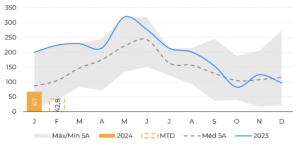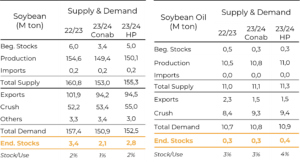
Since March of this year, the percentage of biodiesel blended in Brazil has increased from 12% to 14%. Produced from renewable sources such as vegetable oi

Since March of this year, the percentage of biodiesel blended in Brazil has increased from 12% to 14%. Produced from renewable sources such as vegetable oils and animal fats, biodiesel is a growing alternative to diversify the energy matrix.
The fuel is mainly used in road freight vehicles, such as trucks, buses, and vans. The decision to bring forward the increase in the biodiesel blend in December 2023 by the National Energy Policy Council (CNPE). Previously, it was estimated that this mark would only be reached in 2025.
The measure could impact energy market participants. Want to know how? Read on as we explain more details.
The increase in the biodiesel blend in diesel sold is expected to avoid the emission of 5 million tons of CO2 into the atmosphere. In addition, the federal government stipulates a reduction of approximately R$7.2 billion spent on importing fossil diesel. B15, the 15% blend previously planned for 2026, has also been brought forward to March next year.
The growth of biodiesel’s share in the matrix also aims to stimulate Brazilian agriculture and innovation, fostering job creation and sustainability. Demand for biodiesel is expected to grow and provide 14,000 new jobs by 2024.
The measure aims to reduce the idle capacity of installed plants by up to 18%. It also promotes energy security through the production of 2.4 billion liters of diesel. To this end, the CNPE approved the temporary suspension of biodiesel imports.
A Working Group was also created to prepare a Regulatory Impact Analysis (RIA). The objective is to protect consumer interests in relation to the quality and supply of domestic biodiesel and to promote competitiveness in the international market.
According to the Ministry of Mines and Energy, demand for commodities, especially soybeans, is expected to increase by about 6 million tons by 2025.
More information:
We have explained in two points what could be the main effects on the commodity market because of the increase in the biodiesel blend. Check them out below.
With the increase in domestic demand and the decrease in soybean production, it is necessary to analyze how the balance of this commodity oil, used to manufacture biodiesel, will look.
Soybean oil consumption is expected to grow by about 1 million tons due to the B14 mandate. This would imply an increase of 5.5 million tons in soybean crush. However, in 2023, Brazil exported a significant volume of the product due to crop failure in Argentina.
This year, with the prospect of better production in the neighboring country, the Brazilian nation should export less oil. In other words, it will offset part of the increase in domestic consumption. Taking this factor into account, the necessary growth in crushing drops to about 2 million tons.
Soybean oil – balance in million tons.

Source: Hedgepoint, Abiove, ANP
Soybean oil Brazil – Exports (thousands of tons)

Source: Hedgepoint, MDIC. MTD = Mês até o momento
We conclude that the mandate increase is not necessarily a bullish factor, but rather a supportive one. In other words, the difference is subtle. Therefore, higher demand tends to support oil and soybean prices.
However, with the current outlook in Brazil and Argentina, the increase may not be enough to reverse the downward price trend. If production estimates change for both countries and decrease significantly, the reality could change.
Soybean and soybean oil supply and demand

Source: Conab, Hedgepoint
In mid-February, the biodiesel market experienced its first price increase. Data from the National Agency of Petroleum, Natural Gas and Biofuels (ANP) show a small increase of 0.32% in the average price of biodiesel in Brazil.
The justification is lower supply, with mills resorting to early sourcing due to the entry into force of B14. In this scenario, the availability of physical biodiesel may be more restricted than usual, when the blend was 12%.
In the last weeks of March, prices also rose. According to an ANP survey, between March 18 and 24, factories adjusted the prices charged to distributors by more than 4.38%. This is the second largest increase in the product since the market has been operating under a contract system.
Read also:
Being aware of the movements of the biodiesel market makes a difference when making decisions in this sector. At Hedgepoint, we have a market intelligence team that follows and studies relevant developments.
In this way, we help our partners understand local and global movements and how they can affect their markets. After all, volatility is inherent to anyone who trades agricultural and energy commodities. That’s why it’s essential to manage risk to protect against price fluctuations.
By analyzing up-to-date data and reports, we can turn risks into opportunities. From a multidisciplinary team with a deep understanding of commodity market dynamics, we offer sophisticated hedging products.
In our educational platform, called Hedgepoint HUB, we provide educational materials for different levels of knowledge in this market. Try 1 month of Hedgepoint HUB for free and discover how we can help your business!

Rua Funchal, 418, 18º andar - Vila Olímpia São Paulo, SP, Brasil
Contato
(00) 99999-8888 example@mail.com
Section
Home
O que Fazemos
Mercado
Quem Somos
HUB
Blog
Esta página foi preparada pela Hedgepoint Schweiz AG e suas afiliadas (“Hedgepoint”) exclusivamente para fins informativos e instrutivos, sem o objetivo de estabelecer obrigações ou compromissos com terceiros, nem de promover uma oferta ou solicitação de oferta de venda ou compra de quaisquer valores mobiliários, commodity interests ou produtos de investimento.
A Hedgepoint e suas associadas renunciam expressamente a qualquer uso das informações contidas neste documento que direta ou indiretamente resulte em danos ou prejuízos de qualquer natureza. As informações são obtidas de fontes que acreditamos serem confiáveis, mas não garantimos a atualidade ou precisão dessas informações.
O trading de commodity interests, como futuros, opções e swaps, envolve um risco substancial de perda e pode não ser adequado para todos os investidores. Você deve considerar cuidadosamente se esse tipo de negociação é adequado para você, levando em conta sua situação financeira. O desempenho passado não é necessariamente indicativo de resultados futuros. Os clientes devem confiar em seu próprio julgamento independente e/ou consultores antes de realizar qualquer transação.
A Hedgepoint não fornece consultoria jurídica, tributária ou contábil, sendo de sua responsabilidade buscar essas orientações separadamente.
A Hedgepoint Schweiz AG está organizada, constituída e existente sob as leis da Suíça, é afiliada à ARIF, a Associação Romande des Intermédiaires Financiers, que é uma Organização de Autorregulação autorizada pela FINMA. A Hedgepoint Commodities LLC está organizada, constituída e existente sob as leis dos Estados Unidos, sendo autorizada e regulada pela Commodity Futures Trading Commission (CFTC) e é membro da National Futures Association (NFA), atuando como Introducing Broker e Commodity Trading Advisor. A Hedgepoint Global Markets Limited é regulada pela Dubai Financial Services Authority. O conteúdo é direcionado a Clientes Profissionais e não a Clientes de Varejo. A Hedgepoint Global Markets PTE. Ltd está organizada, constituída e existente sob as leis de Singapura, isenta de obter uma licença de serviços financeiros conforme o Segundo Anexo do Securities and Futures (Licensing and Conduct of Business) Act, pela Monetary Authority of Singapore (MAS). A Hedgepoint Global Markets DTVM Ltda. é autorizada e regulada no Brasil pelo Banco Central do Brasil (BCB) e pela Comissão de Valores Mobiliários (CVM). A Hedgepoint Serviços Ltda. está organizada, constituída e existente sob as leis do Brasil. A Hedgepoint Global Markets S.A. está organizada, constituída e existente sob as leis do Uruguai.
Em caso de dúvidas não resolvidas no primeiro contato com o atendimento ao cliente (client.services@hedgepointglobal.com), entre em contato com o canal de ouvidoria interna (ombudsman@hedgepointglobal.com – global ou ouvidoria@hedgepointglobal.com – apenas Brasil) ou ligue para 0800-8788408 (apenas Brasil).
Integridade, ética e transparência são valores que guiam nossa cultura. Para fortalecer ainda mais nossas práticas, a Hedgepoint possui um canal de denúncias para colaboradores e terceiros via e-mail ethicline@hedgepointglobal.com ou pelo formulário Ethic Line – Hedgepoint Global Markets.
Nota de segurança: Todos os contatos com clientes e parceiros são realizados exclusivamente por meio do nosso domínio @hedgepointglobal.com. Não aceite informações, boletos, extratos ou solicitações de outros domínios e preste atenção especial a variações em letras ou grafias, pois podem indicar uma situação fraudulenta.
“Hedgepoint” e o logotipo “Hedgepoint” são marcas de uso exclusivo da Hedgepoint e/ou de suas afiliadas. O uso ou reprodução é proibido, a menos que expressamente autorizado pela HedgePoint.
Além disso, o uso de outras marcas neste documento foi autorizado apenas para fins de identificação. Isso, portanto, não implica quaisquer direitos da HedgePoint sobre essas marcas ou implica endosso, associação ou aprovação pelos proprietários dessas marcas com a Hedgepoint ou suas afiliadas.
aA Hedgepoint Global Markets é correspondente cambial do Ebury Banco de Câmbio, de acordo com a resolução CMN Nº 4.935, DE 29 DE JULHO DE 2021, Artigo 14 do Banco Central do Brasil (BACEN).
Para mais informações sobre nosso parceiro, serviços disponíveis, atendimento e ouvidoria, acesse o link a seguir: https://br.ebury.com/